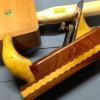Hi everybody.
I usually post in the neander section...this is my first post out of it.
I have seen the light on dust collection, even with the exclusive hand tool use that I participate in (nothing against power tools, just a personal choice for reasons I won't get into).
I have read about the question of the health benefits of air scrubbers/cleaners/filtration systems. I have also had great help from Bill Pentz.
If the woodworking air cleaners aren't sufficient for health benefits, what *can* be done to that fine dust out of the air (besides catching it at the source?).
Stuffing woodworking air cleaners with HEPA furnace filters? Homebrew solutions? Using home-brand HEPA air cleaners (honeywell, austin, etc.)? These are all solutions I've heard of. If we "know" that regular woodworking air cleaners don't provide health benefits, how can we know if these solutions would provide health benefits? Any insights?
Are the home-brand HEPA filters insufficient in terms of CFM? Does stuffing woodworking air cleanrs with HEPA filters mess with the "stock" filtration (if I stuff a hepa filter in, can I remove the inner filter?). Eek! So many considerations. Any comments would be appreciated. Thanks again to Bill Pentz for his incredible knowledge base that he has taken the time to share with everybody.
Thanks!
-Ray










